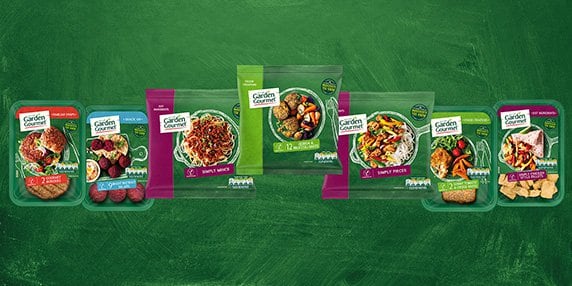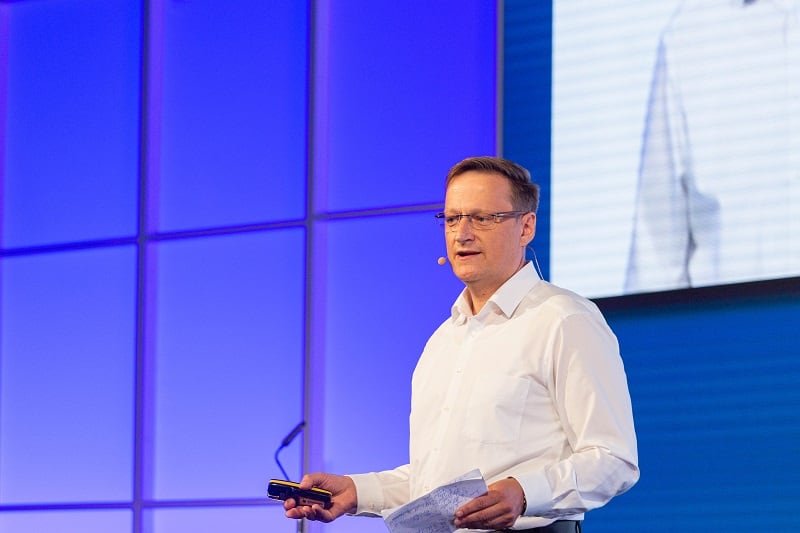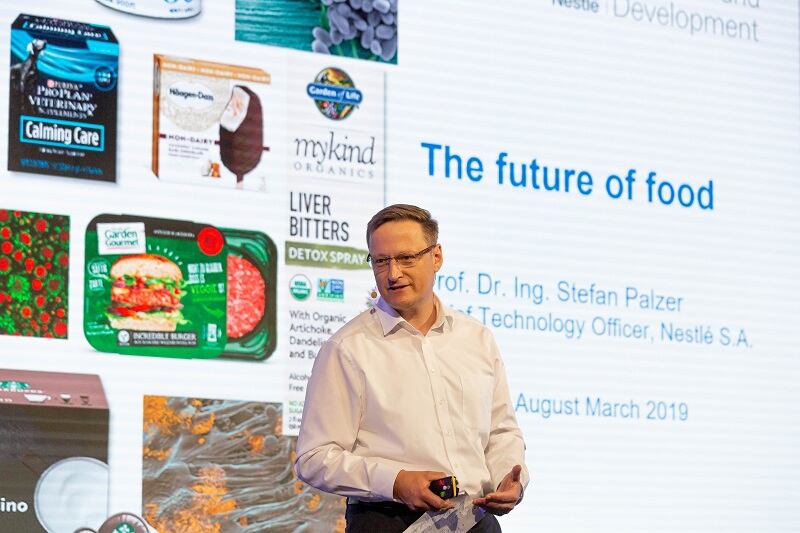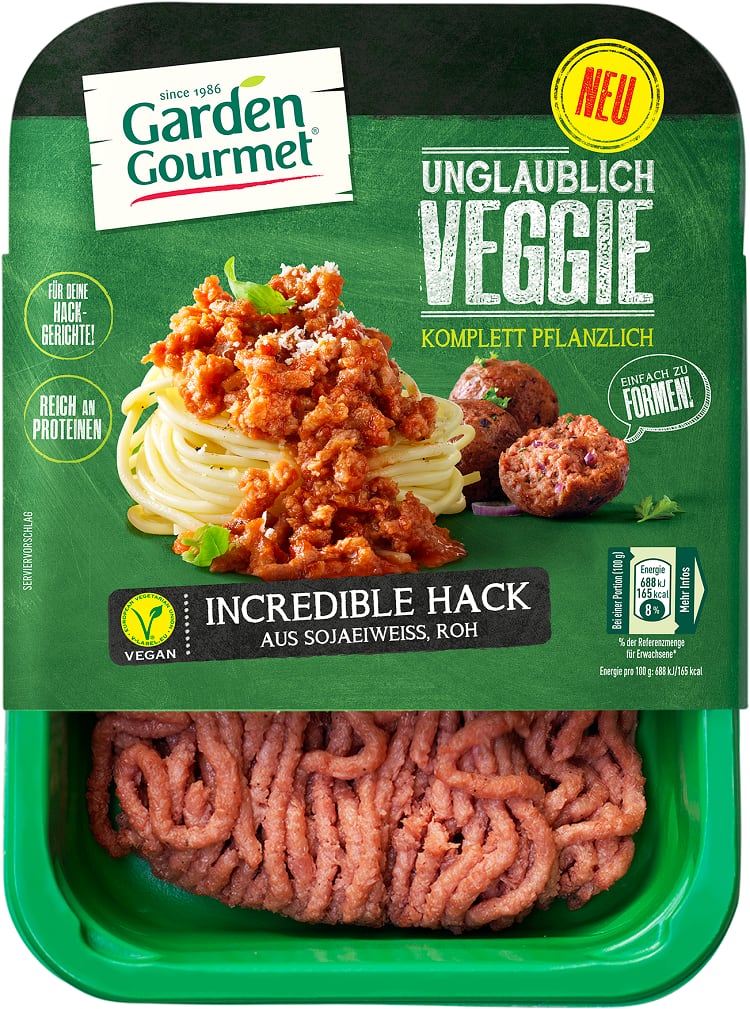Speaking at the Bühler Networking Days event, held at the food technology giant’s headquarters in Switzerland, Nestlé chief technology officer Stefan Palzer gave his insights on the global trends shaping the food industry. He told the audience: "We have to continue to renovate our products based on the needs of society."
'Plant-based nutrition is exploding'
"We've seen in the last couple of years changes in how consumers perceive the value of food," he said. "There's an explosion of different dietary patterns. Probably many of you now have a vegetarian or vegan in the family: I have three of them. I'm the only carnivore who is in the family," he joked. "That's causing a lot of challenges but also opportunities in the food space."
Today, he continued, 'we see vegetarians, paleo, pagan, pescatarian, ketogenic people who eat low carb diets, lactose-free and dairy-free' trends among consumers. The top two new patterns in the US, he stated, are intermittent fasting and the paleo diet. "We are seeing dramatic changes happening in the business. We see fragmentation and many small start-ups. Food is somehow getting cool. You see that in food blogs and TV. Food is a very attractive topic."

Food needs ‘Instagramability’
The continued growth of social media, meanwhile, is changing how food is marketed. The need for novel, diverse food offerings is becoming increasingly important.
"That's driven by social media. There are many food bloggers and influencers which are sharing cool food products. Here, the architecture and the colour of the food product is playing a key role because you cannot share taste and aroma via social media. So it has to look cool. It has to be very exciting and totally new. It’s very important for the younger generation to share food. It needs Instagramability"
Innovation and variety is more important than ever
All this is motivating the food sector to innovate and widen the variety of products. “One segment currently growing very fast is the vegan meat analogue segment where we try to develop products which mimic beef and meat in terms of texture, colour, flavour and appearance.”
Palzer gave further details of Nestlé’s new plant-based burger range. “We use beet to give a red colour that goes brown during cooking. The product is low in cholesterol and very low in fat so we try to achieve a much better nutritional profile and the greenhouse gas emissions are reduced by 90% compared to beef."
Authentic products are also causing a lot of excitement in the marketplace, he noted. The cocoa fruit KitKat for example, "is very sustainable and has a delicious taste."
He celebrated that the search for food novelty among food manufactures combined with changing ideologies among consumers is leading to new food categories such as wheat-free pizzas, plant-based dairy products, alkaline water and nitro-coffee: a fusion of beer and coffee.
Nestlé is also improving its pet food lines as it looks to appeal to millennials. The latest development is a type of pet food that reduces allergies in humans. "We achieved that by adding to the cat food antibodies against the allergy. It's a world novelty and will come soon to the market."

Big hopes for biodegradable plastics
Palzer is optimistic that a solution to plastic pollution will be found soon. "Plastic waste is a major issue, we all know that. We have several solutions. We try to avoid plastics, we make it easier to recycle, and we work on paper packaging. It`s not as easy to provide the same barrier protection through paper packaging that we have with plastic packaging. Plastic is there for a reason, to protect the product. We have some new developments where we coat the paper with biodegradable material. This is very new and I have big hopes that this provides a very good solution.”
Addressing your carbon footprint is fundamental
Bühler’s two-day event focused on the question of how it will be possible in 2050 to feed a global population of almost ten billion people sustainably and healthily.
“Greenhouse emissions are a big problem which is ahead of us,” said Palzer. "When I was speaking here two years ago I did not mention plastic or greenhouse gas emissions. Now this is consuming a lot of my time.”
Consumers expect the industry to address these issues and action to reduce emissions is becoming standard industry practice. "It's a fundamental requirement for every food product which is on the market.”
But he warned the issue of greenhouse emissions was more pressing and harder to solve than the problem of plastic pollution. “There is a lot of altruism which is needed and a lot of activism from different players to solve the issue... We have to have news ways of collaboration."
Collaboration is also key
Nestlé's R&D Accelerator based in Lausanne, Switzerland, will be operational by the end of 2019. The aims of the accelerator is to bring together Nestlé scientists, students and start-ups to collaborate on food innovations.
Palzer revealed Nestlé plans to build these accelerators 'in each of our development centres' around the world to create a global network of innovation. “We will have one in Africa, Singapore and India.. to give start-ups, university teams, suppliers and partners access to all the expertise we have there, including marketing and regulatory expertise."
Answering new health challenges
Another big challenge for the industry is the need to offer affordable, healthy food options for consumers. Providing "highly affordable nutrition for low income consumers is very close to my heart. I think as an industry we have to do much more here."
He also warned that new trends bring new threats. "There's a risk of people getting deficient in certain nutrients," he said. "The prevalence of vitamin b12 and iron deficiency among vegans is very high. 80% of vegan mothers here in Switzerland and in Germany are deficient in those nutrients. What is the effect on their children? That is something to watch out for."



